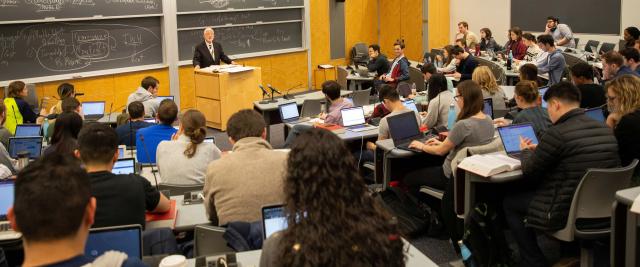Welcome to Law School Insider! This newest installment of our series will feature insights from our Graduate Assistant about different aspects of the law school experience, highlighting the differences between law school and college over a variety of topics including classes, extracurriculars, finals, and more.
What do you know about law school classes?
When you ask students what makes law school classes unique, one common answer is “cold calling.” Despite its notoriety, cold calling is far from the only difference between undergraduate and law school classes. This blog post will review the classroom experience in law school and correct some common misconceptions about what a legal classroom looks like.

The undergraduate classroom experience
Many first-year law classes may look quite similar to lectures at the undergraduate level, but there are many notable differences between the two. In most undergraduate-level lectures, students listen to their professor’s lecture for the entire class period, with the occasional voluntary participation. Assignments are spread throughout the semester to help track student understanding. At the undergraduate-level, students are likely to have different classmates in each of their large lectures. This is extremely different from the typical law school classroom, which will heavily emphasize participation amongst a small group of students.
Who do you take your law classes with?
For the vast majority of law schools, you would take your first year of law classes exclusively with your section in your 1L year. 1Ls are first-year law students. Typically in the 1L year, students are split into both large and small sections, with whom they will take all of their doctrinal classes. Common doctrinal classes that students may take with their large section include: Criminal Law, Constitutional Law, Property, Torts, Civil Procedure, and Contracts. A small section will break down that large section into even smaller groups. A class like Legal Writing & Research is often taken with a small section.
What materials are used for law classes?
The vast majority of 1L classes utilize casebooks. A casebook is a type of textbook that contains excerpts from cases. Cases are legal disputes between people. For example, when a spouse initiates a divorce with their partner, they have started a divorce case. Casebooks use cases to teach students how the law works through real-life application. Casebooks consist of written opinions by judges, which are typically deciding the outcome of a case which has come to court. Students can expect to have new readings assigned from their casebook for every class period.
How do you prepare for class?
While every student has their own method of preparing, many students brief the cases they read. Briefing a case means breaking down the elements of a judicial opinion into a short written summary. Cases can often be long and include lots of information, so it can be helpful to categorize that information. One common way to split up a case is to write a few sentences on each of the following: the parties involved in the case, the issue at hand, any legal rules mentioned, the holding of the case, and the reasoning of the court. If you are called on by a professor, a brief can serve as a quick guide to remember what happened in the case.
What is it like to get called on in a law class?
Most law school classes utilize the Socratic Method. This method, modeled after Socrates’ unique style of teaching, encourages learning through participation and dialogue. Law professors will randomly call upon students to review cases that were assigned for the class.
During a cold call, professors may ask a wide variety of questions that can vary from describing the facts of a case to talking through a hypothetical that will require the student to apply the rules they learned from the readings. Some professors like to stick with a single student during an entire class. Others will jump quickly from student to student after asking a few questions.
Some cold calls, in fact, are not entirely randomized. Some professors will go in alphabetical order, while others will notify students in advance of the week they may be called on. In fact, often in upper-level classes, professors will just expect open discussion without having to formally call on anyone.
What about other class assignments that are not readings?
For many 1L classes, the only assignment you will receive throughout the semester is to complete the readings. This means that most classes conclude with a final exam that makes up 100% of the final grade. Students typically prepare for finals by creating outlines. Outlines are documents which recap everything that was taught throughout the semester, including notes from lecture, discussion, and case readings. Thus, outlines often include shortened versions of briefs, which will describe the main rule of a case in a sentence or two. If you are interested in learning more about preparing for law school finals, keep an eye out for a future installment of Law School Insider!